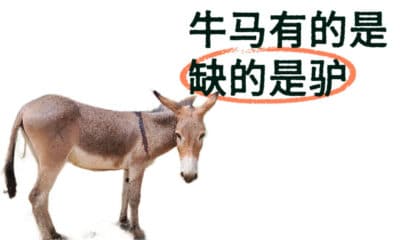China Society
Beyond Climate Change Concerns: Fukushima Fear and Eco-Anxiety in China
“Is our world turning into an apocalyptic survival game?” Fears over Fukushima waste water and other global threats are fueling public anxiety in China.
Published
2 years agoon

While there isn’t a heated ongoing debate about global warming and climate change in China, it doesn’t imply that people are apathetic about the environment and well-being of future generations. Public expressions of ‘eco-anxiety’ and fears for the future are channeled towards different topics in China, where some believe that recent global challenges have transformed their lives into an ‘apocalyptic survival game.’
Over the past ten days, Japan’s decision to release treated nuclear water has ignited waves of anger and concern on Chinese social media platforms. Many netizens express worries about how the Fukushima wastewater might impact the marine ecosystem, while others are deeply concerned about the long-term repercussions of this pollution on their food safety and overall well-being in the coming decades.
The huge public concern over the Fukushima water seemingly poses a stark contrast with that over climate change. As Miranda Barnes recently noted in our Weibo Watch newsletter, the urgent implications of climate change and global warming caused by human activities are a huge topic of debate in Western countries, especially in relation to extreme weather. In China however, the phenomenon of “eco-anxiety” doesn’t resonate among the public in the same manner as it does in Western discourse, despite notable events like China recording historically high temperatures in July, the impact of Typhoon Doksuri, last summer’s wildfires and this summer’s devastating floods.
In a recent Reuters article about the discussions surrounding climate change in China, a Greenpeace senior adviser called it a “big missed opportunity” that Chinese state media and official channels did not connect the recent extreme weather in the country to its own carbon emissions and climate change at large.
China’s limited engagement with the climate change discourse is also noticeable in the realm of social media. Researchers Chuxuan Liu and Jeremy Lee Wallace published a study about “China’s missing climate change debate” (2023), concluding that social media site Weibo does not have very active discussions about the topic of climate change at all. They found that only 0.12% of the unique trending topics on Weibo from June 2017 to February 2021 were related to this theme.
Some news articles suggest that the lack of climate crisis discussions in China relates to the challenges faced by grass-roots environmental movements in contemporary China, alongside censorship.
But climate anxiety is not the only form of eco-anxiety, and it would be a misconception to assume that absence of panic over climate issues means that Chinese people are not concerned about the environment or the well-being of future generations at all. As explained in Eco-Anxiety and Pandemic Distress, various global threats, including climate change, ecological challenges, and pandemics, are interconnected in multiple ways. Pandemics can influence ecological problems, for example, and ecological dynamics and climate factors can also cause outbreaks and shape pandemics (Pihkala 2023, 1).
Climate change, global warming, and environmental activism may not hold as prominent a place in daily social life and online media in China as in the West, but some topics related to global ecological challenges — often communicated by state media and amplified by public responses — actually garner more engagement than in Western countries.
We delve into a few examples in this article. Given the scope of our discussion, we won’t go into the scientific details behind these phenomena; instead, we’ll center our attention on the public anxiety surrounding them.
Public Panic over Fukushima
Japan’s decision to start discharging treated nuclear water into the Pacific has already become one of the biggest topics on Chinese social media this year. Through Weibo posts, short videos, articles, and memes, people vociferously criticized Japan for what they saw as an irresponsible act of releasing “contaminated water” (污染水) – a concept popularized by official channels highlighting the toxicity of the disposed water, as opposed to the more neutral “treated water” (废水) term.
In the first days surrounding the Fukushima waste water release, a trending topic on Chinese social media highlighted how the move would harm to the oceanic ecosystem, with many people posting photos of dolphins, sealions, whales, fish, and other wildlife that could be affected by water pollution alongside the hashtag “History Won’t Forget.”
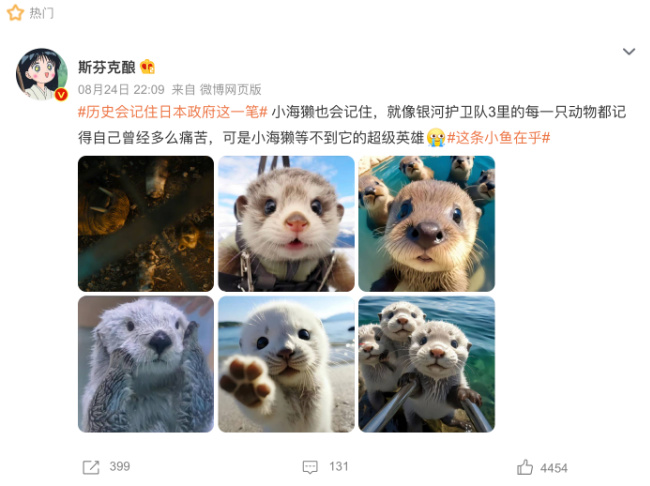
This post claimed that “the sea otters will also remember” what Japan has done.
In addition to a surge in anti-Japanese sentiments and concerns about the livelihoods of the Chinese fishing industry, another significant aspect of the viral online responses to the Fukushima wastewater issue has been the discussions regarding strategies for how to survive the perceived crisis.
While in the English-language media sphere, critics dismissed the panic as unwarranted, stressing that the disposal is well within safety limits or that environmental impact is negligible, the release of the treated water caused an outbreak of apocalyptic fears and many people immediately took action to protect themselves and their loved ones in various ways.
These fears are widespread, encompassing notions such as the contaminated water having the potential to induce mutations in marine life and elevate the risk of cancer when consumed by humans.
On the day preceding the wastewater release, Chinese state media outlet China Daily launched a hashtag about how “the nuclear-treated water will reach our seashore in 240 days” (#核废水排放后240天就会到达我国沿岸海域#). This statement was based on a Tsinghua University simulation study into how the tritium will spread.
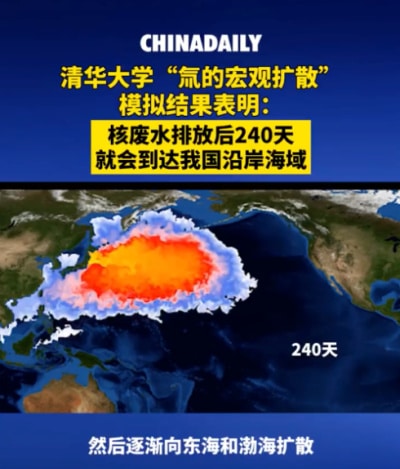
A screenshot from the video posted by the Weibo account of China Daily about the simulation study, showing that the water will reach China’s seashore after 240 days.
The idea that the contaminated water discharged into the Pacific could reach China within less than eight months quickly gained traction on social media platforms, with many netizens reposting and highlighting the timeline, even planning their “last activities” within these days, such as consuming China-produced seafood or visiting the beach.
Rumors suggesting that the released water would reach the United States long after affecting China and nearby countries also gained widespread online popularity. Some of these analyses led to suspicions that the release of treated water must be a joint conspiracy by Japan and the United States, with the specific aim of targeting the lives of Chinese people.
Guidelines on how everyday practices could mitigate radioactive harm widely circulated. These included recommendations such as taking showers after it rains, identifying makeup products free from radioactive elements, or transitioning to a more vegetarian-based diet. Many of these tips, however, have no scientific basis. One restaurant in Shanghai even started offering anti-radioactive menus.
Meanwhile people began hoarding supplies in preparation for long-term survival. In the coastal city of Weihai, the closest Chinese city to South Korea, four tons of salt were sold in just one hour as citizens queued to stockpile salt on August 24. The salt frenzy stems from collective concerns about the impact of Fukushima water on food safety and that table salt – in the near future and in the decades to come – might also become compromised. There’s also a believe that salt might help in case of radiation pollution (iodized salt, however, is actually no antidote for radiation).
Although muck of the panic buying may have evoked memories of the past Covid years and preparations for the potential next lockdown, people actually also started hoarding salt back in 2011 shortly after the nuclear accident at Fukushima Daiichi in March of that year.
Russia’s Anthrax Outbreak
Similar to the Fukushima wastewater responses, the same question of “how long does it take to arrive in China” also frequently pops up in the discussions surrounding the spread of anthrax in Russia. Anthrax is a serious infectious disease that occurs naturally in soil and can cause severe diseases to both humans and animals.
While Western media mostly focused on the Prigozhin jet crash incident, news of a mysterious anthrax outbreak in Russia (#俄罗斯一地暴发细菌性炭疽病#) has garnered attention on Chinese social media, causing significant concern. A current hypothesis directly connects climate change and the outbreak by suggesting that the thawing of frozen soil might have exposed people to decades-old infected reindeer carcasses.
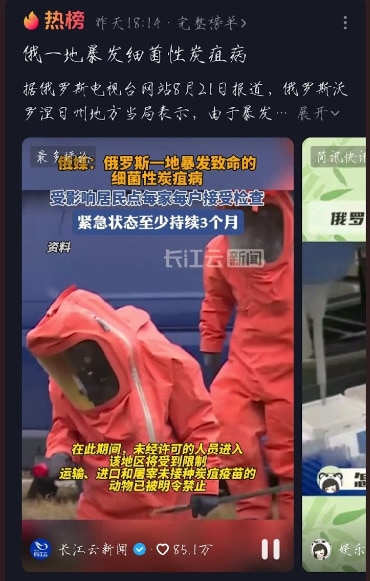
A screenshot of the search result on Wechat channels on the topic of Russia’s anthrax, which shows that one related videos received 851,000 likes. Image shared by a netizen on Weibo.
In the comments under reports about the anthrax outbreak, many people are curious about how close the outbreak is to China’s borders. Others are researching anthrax transmission and fatality rates, wondering if it could turn into another global pandemic.
While most people are concerned about the outbreak’s potential impact, some are politicizing it without clear evidence, accusing the US of engaging in new “biological warfare” in Russia.

An image of the game “Resident Evil: Death Island” from a game review article.
The unease about Russia’s anthrax outbreak possibly being linked to “biological warfare” aligns with the public’s anxiety about mutations caused by Japan’s release of radioactive water. These worries amplify existing concerns about environmental changes, drawing parallels with the dystopian world of the Japanese survival horror game “Resident Evil,” where players face environments filled with zombies and other terrifying creatures. In discussions about the anthrax situation, a recurring question emerges: “Why does our reality increasingly resemble an apocalyptic survival game?”
Covid-19 Subvariants and Monkeypox
Apocalyptic game survival always becomes challenging when there are more than two crises unfolding at the same time. Beyond the concerns about contaminated water and anthrax outbreaks, another issue has captured the attention of the Chinese public recently – the spread of the latest Covid-19 subvariants, EG.5 and BA.2.86.
EG.5 is now the most prevalent in the US and has been detected in at least 52 countries. BA.2.86 is much less widespread, but scientists are alarmed by how many mutations it carries.
While more Chinese social media users are sharing their own experiences of getting Covid a third time, people begin to worry about the possible impact of a massive Covid-19 third wave, referred to as sān yáng (三阳). At the same time, some accounts are giving daily updates on new global cases of BA.2.86, and news reports related to new Covid sub-variants ignite strong reactions from netizens.

“Do not come over” meme used during the monkeypox outbreak.
We have seen similar responses related to news about monkeypox (mpox), with one domestic case of monkeypox occurring in July of this year becoming a top trending topic. Soon after, China saw the world’s fastest increase in cases of mpox, leading to significant concerns expressed by many, with people seeking information on preventive measures to avoid contracting the virus and expressing their hopes that the virus will remain far away from them.
Apocalyptic Games
“The main task is to stay alive”, concluded numerous netizens on Weibo after listing recent hashtags related to nuclear water, anthrax, and the next Covid-19 subvariant in their posts.
The combination of recent crises involving the environment and public health has made the prospect of impending catastrophe feel distressingly real to many. Half-jokingly, young people on Weibo express their concerns about having shorter lifespans. One netizen even humorously remarks, “Paying into your pension plan under these circumstances is almost like a form of romantic heroism,” suggesting that maintaining the belief that one will live long enough to enjoy their pension is overly optimistic and somewhat naive, especially in the face of present-day global challenges.
Beyond concerns about pension plans, a reluctance to have children has also emerged as a common sentiment, especially after Japan’s release of nuclear treated water. A viral screenshot of a street interview in Hong Kong captures the essence of this sentiment. In the interview, a young person nonchalantly responds that he isn’t worried about contamination of Japanese seafood because he doesn’t plan to have children. While not everyone shares this carefree attitude, many agree that having children in the current climate would be risky and senseless given the state of the world today.
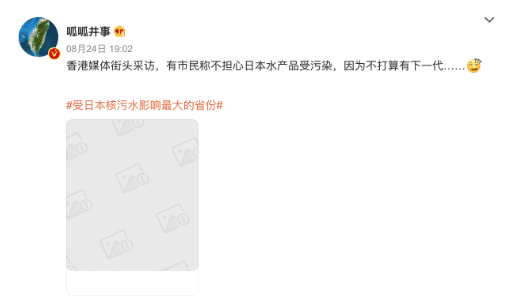
A Weibo user sharing the screenshot of the interview on Weibo and comment that “[This is from] a street interview in Hong Kong. Some citizens said they did not worry about the contamination of Japanese seafood because they did not plan to have children.” The screenshot has now been censored.
Some netizens humorously assume the roles of players in an apocalyptic survival game, assigning different tasks to themselves.
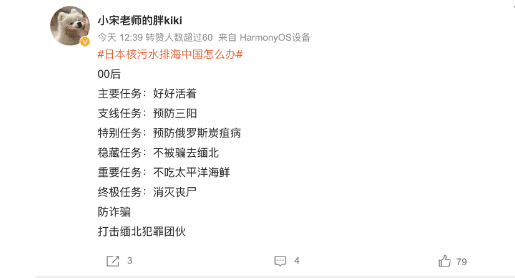
A Weibo user sharing their “tasks” in the survival game.
Under the hashtag ‘What China Can Do When Japan Releases Contaminated Water in the Ocean’ (#日本核污水排海中国怎么办#), one netizen outlines tasks for ‘players’ based on priorities: “Primary task: stay alive; Side-quest: prevent a third-time Covid-19 infection; Special Task: prevent Russia’s anthrax; Hidden task: avoid being deceived by North Myanmar; Important task: avoid consuming seafood from the Pacific Ocean; Final task: eliminate zombies.” Similar tasks have been listed in other posts, reflecting the sentiment that a mass extinction event is looming, making survival increasingly challenging.
Eco-Anxiety and a Bleak Future
While the term ‘eco-anxiety’ is familiar in Western societies and used by environmental activists, it has yet to become popular among the general public in mainland China, and there is no widely recognized Chinese translation for it. However, this doesn’t mean that only vocal activists are concerned about ecological disasters, or that ordinary people in China are indifferent to global challenges because their concerns are not framed in terms of climate change or expressed through activism.
As numerous studies have shown, ecological anxiety is not exclusive to the West. It’s just that the Western language and framework may have captured this mentality first, making it easy to overlook individuals in other regions who share the same sentiments but express them differently.
Certainly, as elsewhere, mainstream national media in China also contribute significantly to events and incidents that fuel “eco-anxiety” among the public. Moreover, changing political narratives play a pivotal role in shaping these dynamics.
In contrast to the West, Chinese media doesn’t necessarily connect global warming to the nation’s carbon emissions. A recent article published by The Economist discussed official and public discussions being “inward-looking” and avoiding direct engagement with climate change debates.
However, as recently pointed out by Miranda Barnes in our newsletter, additional factors contribute to the distinct responses of Chinese netizens, particularly regarding personal consumption and how individual behavior is connected to climate change. With many people, especially elderly, feeling they bear no responsibility for major pollution or gas emissions, “extreme weather” (“极端天气”) topics on on Chinese social media mostly center around personal safety, self-rescue strategies, and considerations for insurance rather than the collective responsibility of humanity for causing climate change.
Complicating matters further, the presence of low social trust and public skepticism towards official media exacerbates eco-anxiety and other concerns about well-being and the future. People often believe that prioritizing individual self-help and self-protection is the safer option, leading to behaviors like panic buying, even when official sources advise against hoarding.
It is also noteworthy that many of the topics that people are concerned about when it comes to eco-anxiety and public health scares are linked, either directly or indirectly, to foreign countries. While several socio-historical factors contribute to these fears, there are critics who argue that Chinese leaders might exploit public sentiment against Japan or the US to deflect attention from their own internal economic, ecological, and political challenges. On the other hand, some Chinese commentators interpret the Western world’s apparent indifference to these issues as a prioritization of political strategies and capitalist profits over ecological concerns.

A cartoon posted on Weibo showing the US creating a samurai sword for Japan to fight with, mocking the US’s supportive attitude in Japan’s release of treated water.
Eco-anxiety is a collective response to various interconnected issues, including pandemics, disease spread, food security, environmental disasters, and the well-being of future generations. It’s like a complex puzzle where many pieces are intertwined, often involving intricate geopolitical and domestic political dimensions.
After the recent Fukushima fears, one person wrote on Weibo: “A while ago when listening to the BBC, I first heard the English term ‘eco-anxiety’ and I originally did not understand at all, why would people suffer from ‘eco-anxiety’? I hadn’t seen anyone around me with such emotions. But I get it now. I’m already deeply anxious myself.”
By Zilan Qian and Manya Koetse, with contributions by Miranda Barnes
Follow @whatsonweibo
References:
Liu, Chuxuan and Jeremy Wallace. 2023. “What’s Not Trending on Weibo: China’s Missing Climate Change Discourse.” Environmental Research Communications 5 (1).
Pihkala, Panu. 2023. “Introduction” In: Eco-Anxiety and Pandemic Distress. Edited by: Douglas A. Vakoch and Sam Mickey, Oxford University Press.
Get the story behind the hashtag. Subscribe to What’s on Weibo here to receive our newsletter and get access to our latest articles:
Spotted a mistake or want to add something? Please let us know in comments below or email us. First-time commenters, please be patient – we will have to manually approve your comment before it appears.
©2023 Whatsonweibo. All rights reserved. Do not reproduce our content without permission – you can contact us at info@whatsonweibo.com.
Stories that are authored by the What's on Weibo Team are the stories that multiple authors contributed to. Please check the names at the end of the articles to see who the authors are.

You may like
China Memes & Viral
Nanchang Crowd Confuses Fan for Knife — Man Kicked Down and Taken Away
An unfortunate misunderstanding led to one innocent man being the only person injured in a crowd of thousands.
Published
12 hours agoon
October 5, 2025
On the evening of October 1st, National Day and the start of a week-long holiday, Nanchang was celebrating with a spectacular fireworks/drone show, drawing an enormous crowd of people (see video).
But the fireworks weren’t the only thing drawing attention. One man on Nanchang’s crowded Shimao Road caught bystanders’ eyes.
He was shirtless, strongly built with a visible tattoo, and was waving a pointed object while loudly shouting something that sounded like, “I’ll kill you! I’ll kill you!”
At first, the people around him seemed unsure of what to do, keeping their distance and too afraid to approach. A large crowd formed but stayed back.
Then, a brave young man in red rushed forward and snatched the pointed object from his hand, while another young man leapt in with a flying kick that knocked him to the ground.
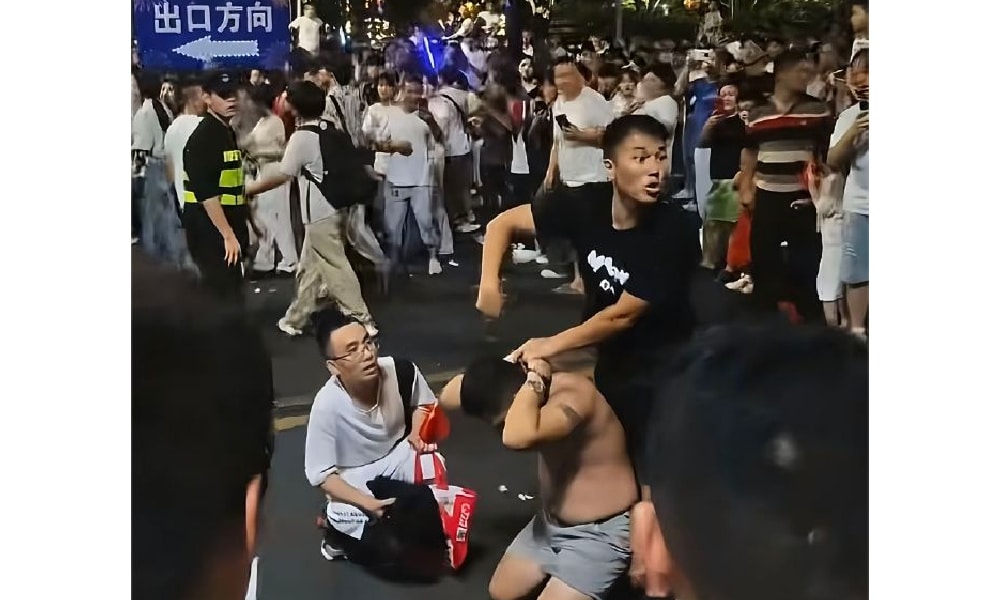
Several others then joined in, working together to restrain the man, as onlookers surrounded the scene and held him there until police arrived and took him to the station.
Soon, videos of the incident spread online (see video here), and rumors quickly surfaced that the man had been trying to attack people with a knife.

But that all turned out to be one major misunderstanding.
The next day, local police clarified what had actually happened, followed by an explanation from the man himself.
The man in question, a 31-year-old local second-hand car dealer named Li, had come to see the fireworks together with his family, including his sisters and three nephews.
Because of the very hot weather, he had taken off his shirt and was cooling himself with a 10-yuan folding fan he had just bought along the way.
After the show, while walking back, Li realized one of his nephews was missing and searched for him, calling out in his local dialect: “Where’s my kid? Where’s my kid?” (“我崽尼 我崽尼” wǒ zǎi ní).
Bystanders misheard this as “我宰你 我宰你” (wǒ zǎi nǐ, wǒ zǎi nǐ, “I’ll kill you, I’ll kill you”) and mistook his folding fan for a machete.
Meanwhile, Li couldn’t understand why people around him were avoiding him and keeping their distance from him while he was searching for his nephew (see that moment here, also see more footage here). People were watching him, and recording the scene from a distance.
Before Li realized what was happening, the fan was snatched from his hands and he was violently kicked. A crowd swarmed him, beat him, and pushed him to the ground.
The police then detained him, and it wasn’t until the early hours of October 2, after thorough questioning, that he was finally released.
“I’m still confused about it,” Li said the next day. Holding the fan up to the camera, he asked: “Can a fan like this really scare people? I don’t understand — I just got beaten for nothing.”
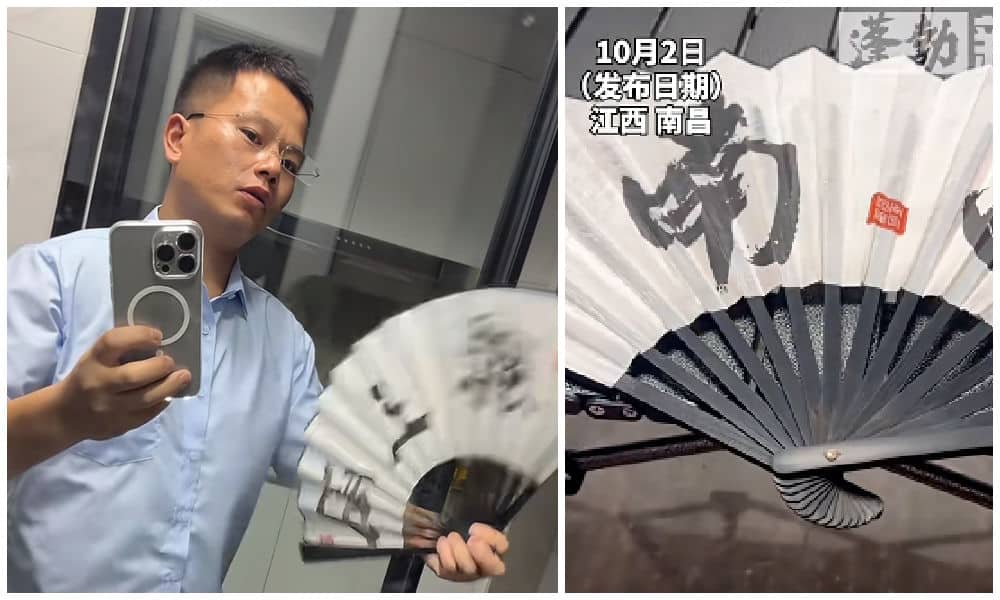
Mr Li in his video, showing the fan he bought for 10RMB/$1.4 at the Nanchang fireworks.
Some commenters remarked that out of the 1.2 million people who were out in Nanchang that night, he was the only one injured.
Li seems to be doing ok apart from a sore backside and a puzzled mind, and his nephew apparently is also safe and well.
The bizarre misunderstanding has sparked widespread banter online, with people now referring to Li as “Nanchang Brother Fan” (南昌扇子哥).
“I’m dying of laughter. It’s both tragic and hilarious,” one Douyin user wrote, while others simply called the situation “so drama” (抓马 zhuāmǎ): “I’m not supposed to laugh, but I can’t help it.”
Some also noted that they understood why people at the scene mistook Li for a criminal: “At night, a guy with tattoos, holding a long stick-like object, shouting loudly all the way, what would you think?”
All joking aside, the public’s response on such a crowded night — when so many people gathered together, potentially making a tempting target for those with bad intentions — shows a heightened sense of vigilance. Unlike the U.S., where gun violence is more common, shootings are rare in China. But random stabbings have increasingly made headlines.
For Nanchang in particular, a stabbing incident that shocked the nation had taken place only weeks earlier: a 19-year-old woman was attacked and stabbed more than ten times by a 23-year-old man she did not know, and later died from her injuries.
But there have also been other recent cases, from Wuhan to Leiyang. And in 2024 especially, a spate of stabbing incidents shocked the country. In Wuxi, Jiangsu Province, a mass stabbing left eight people dead and 17 others injured.
The positive takeaway from this entire mix-up is that the quick action of the crowd — despite their wrong assessment of the situation — shows that people weren’t afraid to step in for the sake of public safety.
But others claim the exact opposite is true. Illustrator and commentator ‘Wu Zhiru’ (吴之如), former editor at Zhenjiang Daily, saw the incident as an example of toxic herd mentality. He posted an illustration of a fan being held up with the characters 清风徐来 (qīng fēng xú lái, “a cool breeze slowly blows”), an idiom to describe a pleasant atmosphere. A finger from the right points at the fan-holder, saying “Look, he’s gonna commit violence!” (“哇,他要行凶啦!”)

Wu Zhiru warns against panic-driven mob mentality and wonders why the first man, who snatched the “knife” from Li’s hands, did not stop the crowd from attacking Li as soon as he discovered that he had snatched away a fan and not a blade. Drawing historical parallels to the Cultural Revolution, Wu argues that people are sometimes so set on doing the “heroic” thing that they hesitate to correct misunderstandings once better information is available — a mindset that can lead to serious, harmful consequences.
For Li himself, despite the unfortunate night he had, the situation has actually brought him some unexpected fame and extra attention for his second-hand car dealership, which undoubtedly makes his boss happy (in a very recent livestream, Li was praised for being kind and loyal).
Many netizens also argued that the real lesson to draw from this ordeal is the importance of speaking proper standard Chinese. Some even framed the incident as “The Importance of Mandarin” (论普通话的重要性), pointing out that the whole problem began because Li was misunderstood while speaking dialect.
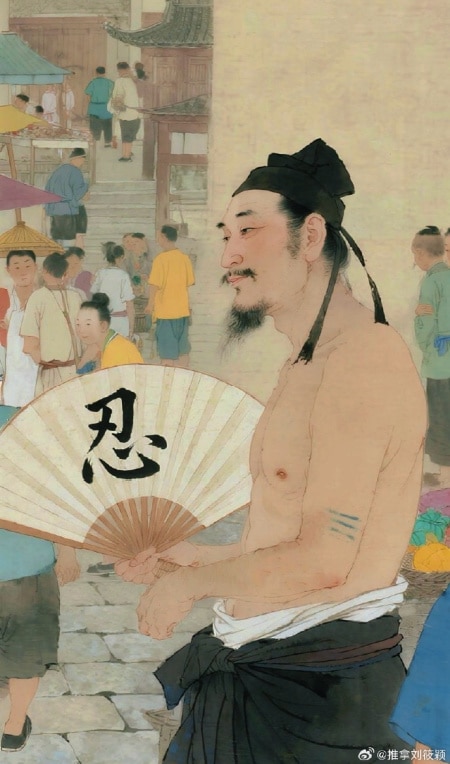
Image posted on Weibo in support of the “fan-waving brother.” The character on the fan says “tolerate.”
Others joked that the misunderstanding was just a grave injustice to shirtless men everywhere, writing: “From now on, the world has one less sincere guy who goes shirtless in the streets. He’ll never be the same again.”
By Manya Koetse
(follow on X, LinkedIn, or Instagram)
Spotted a mistake or want to add something? Please let us know in comments below or email us. First-time commenters, please be patient – we will have to manually approve your comment before it appears.
©2025 Whatsonweibo. All rights reserved. Do not reproduce our content without permission – you can contact us at info@whatsonweibo.com.
China Memes & Viral
China’s National Day Holiday Hit: Jingdezhen’s “Chicken Chop Bro”
From viral street food vendors to China’s donkey crisis and new eldercare services, here’s this week’s Weibo highlights in What’s on Weibo’s China Trend Watch.
Published
6 days agoon
September 30, 2025
🔥 What’s Trending in China This Week? Stay updated with China Trend Watch by What’s on Weibo — your quick overview of what’s trending on Weibo and across other Chinese social media, curated by Manya Koetse.
What’s inside:
- 1. Jingdezhen’s “Chicken Chop Bro” Becomes Nationwide Meme
- 2. China’s 2025 Golden Week Travel Trends
- 3. China Faces Donkey Shortage Crisis
- 4. Word of the Week: “Ride-hailing for Relatives” 亲属打车 Qīnshǔ Dǎchē
- 5. What’s Inside at a Glance
1. Jingdezhen’s “Chicken Chop Bro” Becomes Nationwide Meme
From Beijing to Zibo, every now and then, food stall vendors go viral — for their charm, their uniqueness, and most of all, their tasty food. The star of this moment is 48-year-old Li Junyong (李俊永), who runs a small fried chicken stall in Jingdezhen, Jiangxi Province, with tight rules on who he serves, when, and how.
Li has suddenly become one of the most trending people on Chinese social media under the nickname “Chicken Chop Brother” (鸡排哥 jīpáigē).
Li initially gained popularity among customers for his frantic, multitasking energy — he doesn’t mess around when it comes to his chicken chop business, with superspeed and a clear order of serving customers (“I’ll first do you, then finish yours, then I’ll serve you 做完你的做你的”) and rules such as: no individual customers after 4:30 PM; students pay 1 yuan (about $0.15) less than regular passersby (after 12:00 PM, however, it costs 1 yuan more as punishment for being indecisive); and customers must open the plastic bag themselves before he puts the hot chicken cutlet inside.
The serious way he goes about dealing with his chicken chops almost makes you think he was making big business deals instead of selling to middle school students. In the end, it’s that attitude that gained him social media fame, as students started referring to him as “Head of Chicken Cutlet Operations” (free translation for 鸡排主理人 Jīpái gē Zhǔlǐrén).
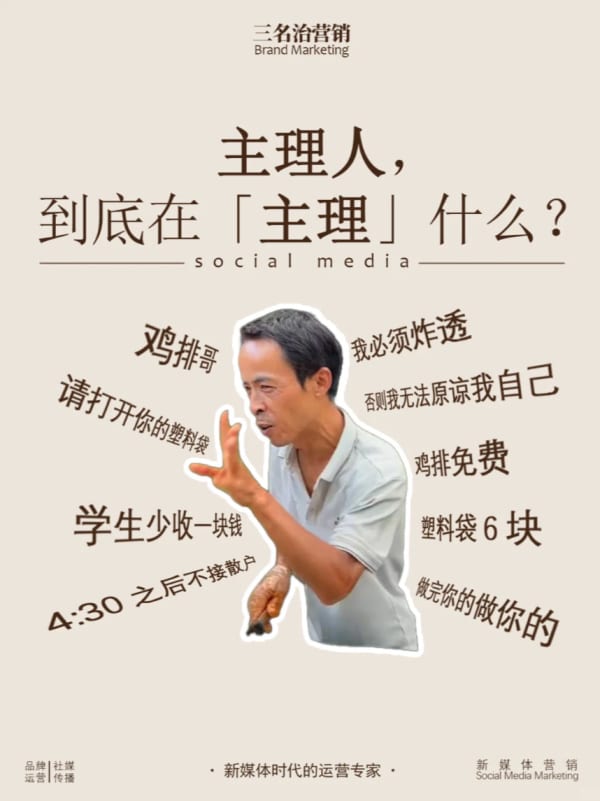
Head of Chicken Chop Operations: “Please open your plastic bag”, “No individual customers after 4:30 PM”, etc.
In light of Li’s explosive popularity, his chicken chop stall now sees extremely long queues, and local authorities and city management have had to intervene in order to control the crowds and keep the location safe.
There are definite downsides to such sudden fame, and Li is not the first street vendor this has happened to.
In 2023, for example, Beijing’s ‘Auntie Goose Legs’ (鹅腿阿姨) went viral, and the food stall owner became so overwhelmed that she temporarily had to take a break from her food stall, emotionally sharing how she said she felt too much pressure because of how the situation was unfolding, and that she just wanted to sell her goose legs in peace (“只想平平安安做烧烤”).

Long lines for Auntie’s goose legs.
It seems that “Brother Chicken Chops”, in line with his reputation as the chicken chop CEO, is trying to turn his viral moment into a sustainable business. According to Sina News, Li has drawn in relatives to help him. He reportedly has taught them how to make and sell his tasty fried chicken chops, and now his Chicken Chop Family (“鸡排家族”) has grown to a total of nine stalls.
Over the past week, Li has also joined several social media platforms, including Xiaohongshu, to build a social following that will last after the hype calms down.
Meanwhile, Li is the meme of the moment. As many Chinese workers experience working stress before the National Day holiday, they’ve used his superspeed working style videos to express the pressure they feel to finish all their deadlines. See videos here.
— What Else Is Trending —
2. China’s 2025 Golden Week Travel Trends
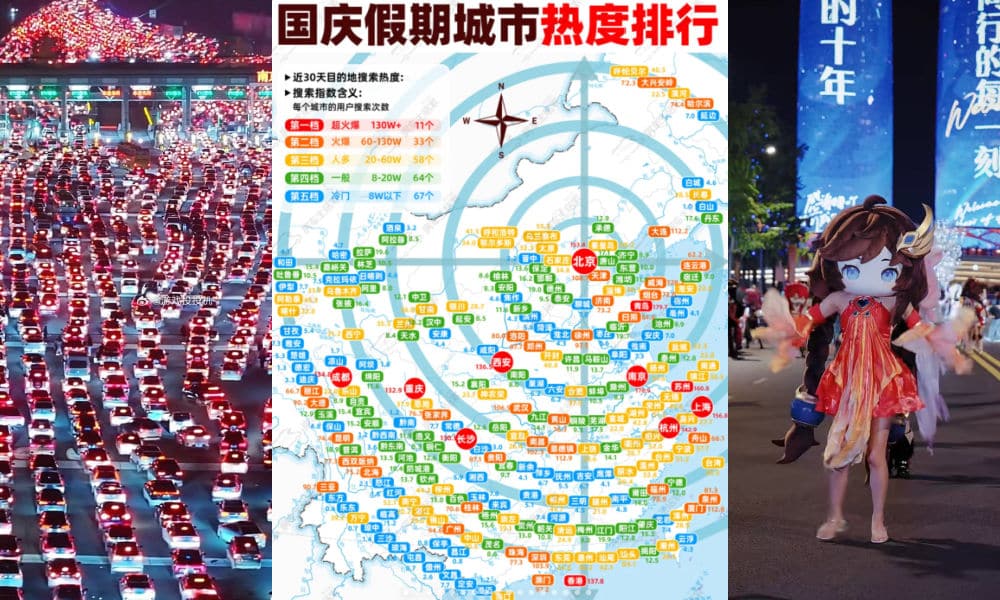
China’s longest holiday of 2025 is coming up, combining National Day (国庆节) and Mid-Autumn Festival (中秋节) into an eight-day Golden Week from October 1–8. If you’re traveling in China this week, good luck — the country’s transportation infrastructure is being pushed to its operational limits.
On September 30, the first “smart people” who opted to leave early to avoid traffic jams already found themselves stuck in them. China’s Ministry of Transport estimates a staggering 2.36 billion trips will be made during this period, with October 1 expected to see over 340 million travelers — surpassing the historical peak of 339 million recorded during Spring Festival earlier this year.
🔸 This week is going to see a lot of events. According to the Ministry of Culture & Tourism, more than 12,000 cultural activities will be held across China during the eight-day holiday period, including over 300 large-scale light shows.
🔸 Chinese local tourism offices are going all in on city marketing and are finding new strategies to make themselves more appealing to young travelers. Chengdu, for example, as Tencent’s gaming hub, is integrating the 10th anniversary of the super popular mobile game Honor of Kings (王者荣耀, Wángzhě Róngyào) into its cultural tourism strategy this year, organizing game-themed city walks, exhibitions, and more.
🔸 China’s travel platform Trip.com reported that interprovincial travel bookings have surged 45% year-on-year, with particularly strong interest in remote destinations like Xinjiang, Tibet, and Inner Mongolia. Searches for hotels in these regions jumped 60% compared to last year. This reflects a shift among middle-class Chinese tourists toward experiential travel and natural landscapes rather than crowded urban attractions.
🔸 The holidays are a time for relaxation, reunions, and eating mooncakes, but it’s also a stressful time for Chinese employers who must comply with labor regulations while managing workforce availability and overtime obligations. Under China’s Labor Law, employees working on statutory public holidays—October 1–3 and October 6 (the official Mid-Autumn Festival date)—must receive at least 300% of their normal daily wage. For adjusted rest days (October 4–5 and October 7–8), employers must provide either 200% overtime pay or compensatory time off. The State Council designated September 28 (Sunday) and October 11 (Saturday) as make-up workdays, but private companies have flexibility to adjust their own schedules.
3. China Faces Unprecedented Donkey Shortage Crisis

China is facing a serious donkey shortage. China’s donkey population is far below market demand, and the prices of donkey-related products continue to rise. The Donkey Branch of China’s Livestock Association (中国畜牧业协会驴业分会) addressed this issue in Chinese media earlier last week, telling China News Weekly (中国新闻周刊): “We have plenty of cattle and horses in China now — just not enough donkeys” (“目前我国牛马都不缺,就缺驴”).
4. “Ride-hailing for Relatives” 亲属打车 Qīnshǔ Dǎchē

Tencent has rolled out a new function via WeChat Mini Programs on September 26, aimed at helping seniors who struggle with app-based ride-hailing. Thanks to the new function, now live nationwide, users can order rides on behalf of older relatives directly in WeChat.
Adult children who want to help out their less tech-savvy (grand)parents or other senior relatives can now bind their account to their own, remotely pre-set pickup and drop-off locations, as well as payment methods, and track their journey for safety.
What makes this different from the possibility of just ordering a ride for someone else is that the seniors stay in control to some extent and can see their own journeys on their own phones. Children can configure settings on their side, while the interface for the elderly users is simplified. This allows seniors to ride independently, with a little help from their family.
The move is part of a broader effort in China to make it easier for seniors to stay involved in the digitalization of society.
The word to know is 亲属打车 qīnshǔ dǎchē, consisting of “亲属” qīnshǔ (relatives) and ride-hailing 打车 dǎchē.
5. What’s Trending at a Glance
- ✈️ The 27-year-old Sichuan creator “Tang Feiji” (唐飞机) died in a plane crash while livestreaming on Sept 27. The ultralight aircraft, piloted and purchased by Tang himself, went out of control and crashed before catching fire. Over 1,000 viewers were watching live, with the chat flooded by messages pleading for someone to rescue him. Local village officials confirmed his death. The tragedy is fueling debate over amateur aviation and extreme content creation.
- 🟢 Weibo has rolled out a visible “online status” feature on personal pages, showing when users are online, and not everyone is happy with it. The new feature is met with criticism from concerned users who don’t want others to see they’re online. It brings back memories of China’s legendary IM app QQ, which, like MSN, showed the online status of users.
- 🥿 A Chinese Marriott hotel location in Changzhou has come under scrutiny adn triggered hygiene concerns after guests found out that the in-room hotel slippers were being reused. The hotel has admitted to disinfected the disposable slippers and reusing them 2–3 times, without disclosing this to guests in advance.
- ⚖️ China’s cyberspace authorities issued stern warnings and announced penalties on various Chinese social platforms recently, including Xiaohongshu, Weibo, and Kuaishou, which are blamed for not keeping celebrity gossip and low-quality content in check and for influencing their hot search rankings. This is all about algorithm governance and the tightrope platforms walk in serving readers, attracting attention, and satisfying regulators.
- 👵 “Outsourced Children” services for Chinese seniors went trending recently. In Dalian, an initiative offering companionship and mediation services for seniors charges 500–2,500 yuan ($70–$350) per visit and has apparently been quite a success, underscoring strong market demand of eldercare-related services and new opportunities for Chinese students.
By Manya Koetse
(follow on X, LinkedIn, or Instagram)
Spotted a mistake or want to add something? Please let us know in comments below or email us. First-time commenters, please be patient – we will have to manually approve your comment before it appears.
©2025 Whatsonweibo. All rights reserved. Do not reproduce our content without permission – you can contact us at info@whatsonweibo.com.
Subscribe
What’s on Weibo is a reader-supported publication, run by Manya Koetse (@manyapan), offering independent analysis of social trends in China for over a decade. To receive new posts and support our work, consider becoming a paid subscriber.

Get in touch
Would you like to become a contributor, or do you have any tips or suggestions? Get in touch here!

China Faces Unprecedented Donkey Shortage Crisis

Nanchang Crowd Confuses Fan for Knife — Man Kicked Down and Taken Away

The Wong Kar-wai Scandal Explained: The Dark Side of ‘Blossoms Shanghai’

China’s National Day Holiday Hit: Jingdezhen’s “Chicken Chop Bro”

Evil Unbound (731): How a Chinese Anti-Japanese War Film Backfired

Hidden Cameras and Taboo Topics: The Many Layers of the “Nanjing Sister Hong” Scandal

“Jiangyou Bullying Incident”: From Online Outrage to Offline Protest

The Rising Online Movement for Smoke-Free Public Spaces in China

China Trend Watch: Pagoda Fruit Backlash, Tiananmen Parade Drill & Alipay Outage (Aug 11–12)

From Schadenfreude to Sympathy: Chinese Online Reactions to Charlie Kirk Shooting
Popular Reads
-

 China Memes & Viral3 months ago
China Memes & Viral3 months agoHidden Cameras and Taboo Topics: The Many Layers of the “Nanjing Sister Hong” Scandal
-

 China Books & Literature11 months ago
China Books & Literature11 months agoThe Price of Writing Smut: Inside China’s Crackdown on Erotic Fiction
-

 China Insight5 months ago
China Insight5 months agoUnderstanding the Dr. Xiao Medical Scandal
-

 China Memes & Viral9 months ago
China Memes & Viral9 months agoOur Picks: Top 10 Chinese Buzzwords and Phrases of 2024 Explained

